
Going up in Smoke: issues with rural fire response
Part one of a series on concerns with rural and remote firefighting
By Angela Hill
paNOW Staff
It took about 30 minutes for 9-1-1 dispatchers to find a fire department willing to respond to the recent structure fire in Timber Bay.


